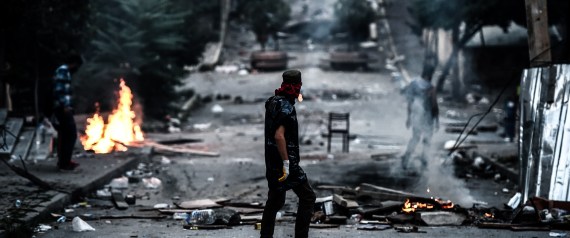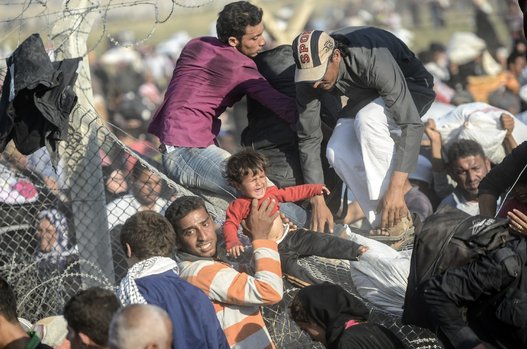Posted: Updated:
ISTANBUL -- The current situation in Turkey is nothing short of apocalyptic. Radical Islamists who have turned the country into a "jihadi highway" to Syria -- while Ankara has looked the other way -- are now carrying out attacks within Turkey itself. Following last week's ISIS-linked bombing in the Turkish border town of Suruç, which killed 32 civilians, it is no longer possible for Turkey to ignore the threat posed by ISIS. Official figures estimate that the group has 700 Turkish citizens in its ranks and that there are dozens of ISIS cells in major cities like Istanbul and Ankara. Residents of such cities have been on the alert for the past few days, with warnings of imminent bomb attacks in public places.
As if this were not enough, last week also saw the end of the two-and-a-half-year-long ceasefire between the PKK and the Turkish state. After the Suruç attack, whose victims were mostly young pro-Kurdish activists, the PKK responded with fatal attacks on Turkish soldiers and police officers. Just days later, Turkish warplanes commenced airstrikes on PKK camps in northern Iraq, signaling the return of Turkey's nightmarish civil war, which has claimed 40,000 lives over the past three decades. To understand Turkey's current plight, one must take a look at the past four years of Turkish foreign policy in Syria.
The AKP's Syria policy from 2011 onward has been the single greatest foreign policy disaster in the history of the Turkish Republic.
* * *
Erdoğan's Quagmire: Syria
The AKP's Syria policy from 2011 onward has been the single greatest foreign policy disaster in the history of the Turkish Republic. When the Arab Uprisings broke out in 2011, the Turkish government, in cooperation with Saudi Arabia and Qatar, began arming the Syrian opposition in camps in southern Turkey. Erdoğan and Davutoğlu calculated that there would be an armed uprising against the Assad regime, which would succumb to airstrikes within a few months (just as Qaddafi's dictatorship had collapsed following U.S./NATO airstrikes in Libya). Assad's seat would then be filled by the AKP's Syrian protégé, the Muslim Brotherhood. Erdoğan fondly imagined himself as the liberator of Syria, boasting in 2012 that he would soon be "performing his prayers in the Umayyad Mosque" in Damascus, while Davutoğlu proclaimedTurkey the "owner and leader" of the new Middle East. However, the Western airstrikes Erdoğan was counting on never materialized. As for the Syrian Muslim Brotherhood -- which never really recovered from the 1982 Hama Massacre and lacked significant popular support -- soon vanished from the stage entirely.
* * *
Enter ISIS
As the situation in Syria deteriorated, radical Islamist groups there received backing from Turkey, Saudi Arabia and Qatar, members of a coalition known -- with surely unintentional irony -- as the "Friends of Syria." Meanwhile, ISIS's power in Syria grew exponentially. There are numerous allegations pointing to a clandestine relationship between Turkey and the Islamic State; according to a Guardian article last week, a military operation by U.S. special forces in eastern Syria this past May resulted in the discovery of "hundreds of flash drives and documents" pertaining to ISIS's sales of petrol to Turkey. The same article asserted that it is now "undeniable" that there were "direct dealings between Turkish officials and ranking ISIS members."
Moreover, it remains unclear under what terms ISIS agreed to free the 49 Turkish diplomats it held captive in Mosul for three months starting in June of last year. Erdoğan himself tellingly described the affair as a case of "political and diplomatic bargaining." Significantly, Turkey declined to join the anti-ISIS coalition formed in September of 2014, its military looking on idly while the Syrian town of Kobane was under siege from ISIS just a few hundred meters across the border. Outrage by Turkey's Kurds over their government's inaction soon sparked country-wide riots in which more than 30 people were killed.
This two-front war against both ISIS and the PKK is a dangerous move; Turkey's 30-year struggle against the PKK proves the impossibility of winning a war against irregular guerilla forces.
Turkey's recent decision to combat ISIS is as much a response to new developments in Syria as to ISIS's attacks within Turkey. ISIS has lost most of the territory it controlled on Turkey's 900-kilometer-long border with Syria, half of which is now in the hands of the PYD, the Syrian branch of the PKK. Thus, in carrying out anti-ISIS operations, Turkey seeks to prevent the PYD from acquiring the last bit of ISIS-held territory on its own border, intending to give it to the Free Syrian Army and other Islamist groups instead. Once these groups have taken control of this 100-kilometer-by-40-kilometer area, Turkey plans to turn it into a safe haven for some of its two million Syrian refugees. Turkey thereby expects to create a military zone of influence in Syria, effectively bypassing Russia's veto on a no-fly zone in northern Syria, which Ankara has been demanding for the past three years. Meanwhile, Turkey has allowed the U.S. to use İncirlik Air Base -- the closest American base to Syria -- for anti-ISIS airstrikes.
Four years into the Syrian civil war, Erdoğan is well aware that Assad -- who is backed by Russia and Iran -- cannot be overthrown by dozens of different militant factions, many of which are at war with one another. Moreover, the U.S. -- still smarting from its own disaster in Iraq -- will surely not support regime change without a clear idea of who will succeed Assad. Nonetheless, Erdoğan is keen to acquire greater influence in Syria even if Assad cannot be immediately deposed. The safe zone envisioned by Turkey would extend almost to the outskirts of Aleppo, Syria's largest city. For Turkish-backed insurgents to take control of Aleppo would be a great PR victory for Erdoğan -- a sort of consolation prize for his failure to conquer Damascus and a boost to his tarnished political image at home.
* * *
Playing with Fire
Last week, Ankara began bombing PKK camps in northern Iraq, thus effectively commencing a two-front war against both ISIS and the PKK. This is a dangerous move for Turkey, whose 30-year struggle against the PKK has taught it the impossibility of winning a war against irregular guerilla forces. Meanwhile, the country is being run by a caretaker AKP government after the ruling party lost its parliamentary majority in the June 7th elections. As his country teeters on the brink of disaster, President Erdoğan seems less interested in solving its problems than in acquiring greater power for himself. For the past year, Erdoğan has sought to become Turkey's "elected sultan" by creating a de facto presidential system. But, counter to his expectations, voters declined to give the AKP a majority.
As his country teeters on the brink of disaster, Erdoğan seems less interested in solving its problems than in acquiring greater power for himself.
By making war on the PKK, the AKP is obviously hoping to sow division between the Kurdish-left HDP (which is known to have ties to the PKK) and the rest of Turkish society. The HDP's remarkable success in the June 7th election -- the first time in Turkey's history that a Kurdish party has surpassed the 10 percent electoral threshold -- was a major factor in the AKP's losing its own majority in parliament. Erdoğan has now declared that a number of HDP deputies will be tried on charges of supporting terrorism. This chilling announcement -- harkening back to the imprisonment of Kurdish MPs during the 1990s -- seems like a patent attempt to de-legitimize the HDP.
Erdoğan may be reasoning that if a coalition government cannot be formed and the country is forced to have early elections in November, growing nationalist, anti-PKK sentiment will allow the AKP to regain its parliamentary majority. In short, Erdoğan and the AKP have not hesitated to elevate party politics above national security. It is Turkey and the Turkish people that will lose out in the end.
Follow Behlül Özkan on Twitter: www.twitter.com/BehlulOzkan















No comments:
Post a Comment